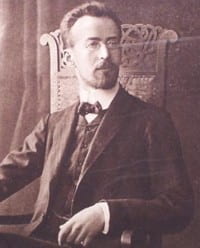11 December 1876, Wiszniewo — 8 February 1909, Tatra Mountains
Biography

Composer, conductor, writer, photographer, and mountain climber Mieczysław Karłowicz was born on his family estate in Wiszniewo (now Vishnyeva, Belarus) and lost his life in a Tatra Mountains avalanche. In his youth, Karłowicz spent some time travelling through Europe (Heidelberg, Prague, Dresden) and in 1887, his family settled in Warsaw where he studied violin with Jan Jankowski and Stanisław Barcewicz. After a few years, poor health (both mental and physical) forced him to give up the violin, but he quickly began studying composition with Gustaw Roguski in Warsaw (1894) and later with Heinrich Urban in Berlin (1895-1901). His early compositions include short piano pieces, the Serenade Op. 2 for string orchestra, Muzyka do białej gołąbki [Music to the White Dove] Op. 6 for orchestra, and various songs which were published in two collections as Op. 1 and Op. 3 and 4.
After completing his studies, Karłowicz returned to Warsaw where he was a board member and later director of the Polish Music Society. He also supported the society financially and bequeathed to it his entire estate. In 1907, frustrated with the atmosphere in the Warsaw musical life, he settled in Zakopane at the foot of the Tatras. As his physical condition began to improve, he completed his greatest orchestral works: Stanisław i Anna Oświęcimowie and Smutna opowieść [A Sorrowful Tale]. His next symphonic poem, Epizod na maskaradzie [An Episode at a Masquerade] was completed posthumously by Grzegorz Fitelberg. Karłowicz’s other works include the extensive Odrodzenie [Revival] Symphony and a Violin Concerto, both written in 1902. His catalogue of works also includes symphonic poems Powracajace fale [Returning Waves], Odwieczne pieśni [Eternal Songs] and Rapsodia litewska [Lithuanian Rhapsody], written between 1904 and 1906.
Karłowicz was the most representative composer of “Young Poland,” the artistic movement based on the idea of a unification of modernistic tendencies and national tradition initiated by Ludomir Różycki, Grzegorz Fitelberg, Karol Szymanowski, and Apolinary Szeluto. Although he did not formally belong to this group, he strongly supported it and his work expressly reflected their ideals. His settings of poems by Kazimierz Tetmajer, one of the most eminent poets of Young Poland, are characterized by a melancholy and yearning lyricism which was stylistically typical of the Polish art of this movement. The programs of his symphonic poems likewise reflect the ideals of pantheism, expressive sorrowfulness, and Wagnerian symbols of love and death. It should also be mentioned that at some times Karłowicz’s work moved toward the philosophy of Nietzsche, and at other times, Schopenhauer.
A master orchestrator, Karłowicz drew on orchestral writing of Strauss, Wagner, and Tchaikovsky but his music, dominated by a mood of sadness, melancholy, and resignation, has a clearly individual character. Karłowicz’s early symphonic poems and lieder showed a great talent that was prematurely extinguished on a lonely skiing trip to Poland’s highest peaks.
More information about Karłowicz can be found in the December 1998 PMC Newsletter.
List of Works
Voice and Piano
Songs Op.1, 3 & 4 to texts by: K. Tetmajer, A Asnyk, H. Heine, Z. Krasiński, J. Słowacki, and others (1897-1898)
Orchestral works
Serenada na orkiestrę smyczkową [Serenade for string orchestra] Op. 2 (1897)
Muzyka do białej gołąbki [Music to the White Dove] for orchestra Op. 6 (1900)
Symfonia e-moll Op. 7 “Odrodzenie” [“Revival”] Op 7 (1902)
Violin Concerto in A-major Op. 8 (1902)
Powracające fale [Returning Waves] Op. 9 (1903)
Odwieczne pieśni, tryptyk symfoniczny [Eternal Songs, a Symphonic Triptych] Op. 10 (1906)
I: Song of Eternal Longing
II: Song of Love and Death
III: Song of the Universe
Rapsodia litewska [Lithuanian Rhapsody] Op. 11 (1906)
Stanisław i Anna Oświęcimowie Op. 12 (1906-1907)
Smutna opowieść [A Sorrowful Tale] Op. 13 (1908)
Epizod na maskaradzie [An Episode at a Masquerade] Op. 14 (1908)
List of Opus Numbers
Op. 1 Songs for voice and piano (1897-1898)
Op. 2 Serenade for string orchestra (1897)
Op. 3 Songs for voice and piano (1897-1898)
Op. 4 Songs for voice and piano (1897-1898)
Op. 5 Prelude and Double Fugue for piano (1897-98)
Op. 6 Music to the White Dove (1899-1900) for orchestra
Op. 7 Symphony in E-minor (1901-1902)
Op. 8 Violin Concerto in A-major (1902)
Op. 9 Returning Waves (1903) for orchestra
Op. 10 Eternal Songs (1904-1906) for orchestra
Op. 11 Lithuanian Rhapsody (1906) for orchestra
Op. 12 Stanisław i Anna Oświecimowie (1906-1907) for orchestra
Op. 13 A Sorrowful Tale (1908) for orchestra
Op. 14 An Episode at a Masquerade (1908) for orchestra
Bibliography
- Anders, H. “Pieśni solowe Mieczysława Karłowicza,” [The solo songs of Mieczysław Karłowicz] Studia muzykologica (1955) p.292-415.
- _______, ed. Mieczysław Karłowicz w listach i wspomnieniach [Mieczysław Karłowicz in letters and remembrances] (Kraków, 1960).
- Bełza, I. Mieczysław Karłowicz (Moscow and Leningrad, 1951).
- Chomik, I., H. Harley, and A. Spóz. “Katalog rękopisów muzycznych Mieczysława Karłowicza w Bibliotece WTM,” [Catalogue of Mieczysław Karłowicz’ musical manuscripts] Muzyka, 10 no. 3 (1965) 76.
- Chybiński, A. “Mieczysław Karłowicz (1876-1909) preludia,” Muzyka polska i (1934) 3.
- _______. Mieczysław Karłowicz (1876-1909) Kronika życia artysty i taternika[Chronicle of the life of an artist and mountaineer] (Kraków, 1949).
- Dziębowska, E. “Instrumentacja Karłowicza a Czajkowskiego,” Polsko-rosyjskie miscellanea muzyczne, ed. Z. Lissa, (Kraków, 1967) p.209ff.
- _______. “Mieczysław Karłowicz jako krytyk muzyczny,” [Mieczysław Karłowicz as music critic] Studia Hieronymo Feicht septuagenario dedicata (Kraków, 1967) p.425ff.
- _______, ed. Z życia i twórczości Mieczysława Karłowicza [From the life and works of Karłowicz] (Kraków, 1970).
- Kęcki, F. Mieczysława Karłowicza: szkic monograficzny [Monographic Sketch] (Warsaw, 1934).
- _______. A Catalogue of Musical Works M. Karłowicza and Moniuszko, (Warsaw, 1936).
- Liebeskind, M. “Utwory fortepianowe Mieczysława Karłowicza,” [Piano Works of Mieczysław Karłowicz Muzyka (1926) nos. 11-12, p.571.
- Lissa, Z. “Karłowicz, Mieczysław,” Entry in Musik in Geschichte und Gegenwart.
- Marek, T. Poematy symfoniczne Mieczysława Karłowicza [Symphonic Poems of Mieczysław Karłowicz] (Kraków, 1959).
- Wightman, A. Karlowicz, Young Poland and the Musical Fin-De-Siècle (Hampshire, 1996).
Page updated on 9 March 2018